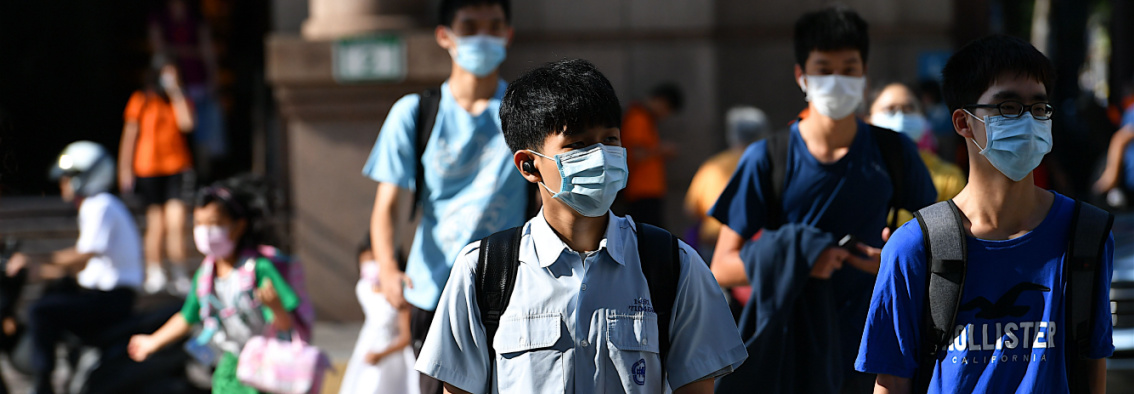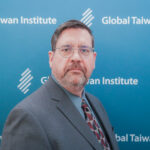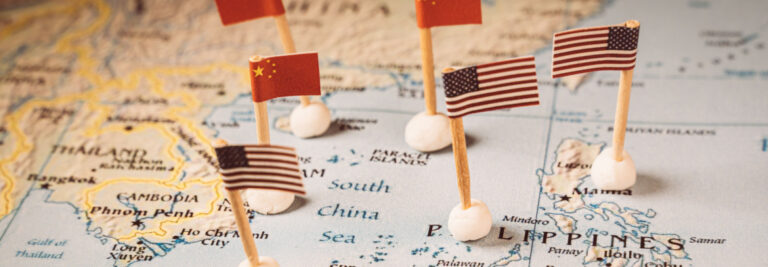In mid-March, former Taiwan President Ma Ying-jeou (馬英九) announced that he would travel to China from March 27–April 7, marking the first time that a former chief executive of the Republic of China (Taiwan, ROC) would set foot in the People’s Republic of China (PRC) since 1949. The stated purpose of the trip was ostensibly personal, with Ma making plans to visit the tombs of ancestors in Hunan Province for the Ching Ming Festival (清明節)—as well as to visit historical sites associated with the history of the Kuomintang (KMT, 國民黨), such as the Sun Yat-sen Memorial in Nanjing and World War II historical sites in Shanghai and Chongqing.
However, as Ma is also a former KMT chairman—who continues to be an influential power broker within the party, as well as an outspoken critic of the Tsai Administration’s policies regarding cross-Strait relations—the announcement inevitably drew speculation and criticism that the trip was also political in nature. Lending credence to these claims, Ma’s trip followed close on the heels of a February visit to the PRC by KMT Vice-Chairman Andrew Hsia (夏立言)—a trip in which Hsia met with senior Chinese Communist Party (CCP) officials, including Politburo Standing Committee (PSC, 中央政治局常委會) member Wang Huning (王滬寧) and Song Tao (宋濤), director of the CCP Central Taiwan Affairs Office (TAO, 中共中央台辦).
While the full agenda of Ma’s trip is unclear, he has held at least some political meetings, such as a March 30 meeting in Wuhan with Song Tao. Ma’s trip is also noteworthy in terms of timing, in that it has overlapped with a 10-day trip by President Tsai Ing-wen (蔡英文) for official visits to Guatemala and Belize, as well as “transit stops” in the United States. Whether the timing was intentional or not, the optics of the two contrasting trips—with Ma on a tour promoting Chinese identity and cross-Strait fence-mending, and Tsai on a visit to shore up ties with diplomatic allies and the United States—have been striking.
Irrespective of the political controversy surrounding Ma’s trip, it contained another element that has received relatively less attention, but is arguably just as significant in terms of understanding the PRC’s united front policies toward Taiwan. Both Taiwan and PRC media have indicated that Ma has been accompanied on his trip by a delegation of Taiwan university students, ostensibly for the purpose of “youth exchange” activities. This latter point is a major focus of the CCP’s united front work directed towards Taiwan, and is worthy of a closer look.
Ma Ying-jeou’s Trip to China and Student “Exchanges”
PRC media has emphasized that alongside the visit by Ma—invariably referred to as a “former Taiwan regional leader” (台灣地區前領導人), rather than “president”—a parallel purpose of the trip would be “exchange between young students and mainland students” (青年學子與大陸學生交流), with Ma being accompanied on his travels by a delegation of university students from Taiwan. Upon landing in Shanghai on March 27, Ma was quoted as stating that: “Apart from going to make offerings to my ancestors, I am also taking Taiwan university students to the mainland for exchanges […] hoping to improve the current cross-Strait atmosphere through the enthusiasm and interaction of young people, so peace can come even faster and sooner to us here.” For its part, the PRC Central Taiwan Office praised the planned exchanges, stating that “[s]trengthening exchange and contacts [between] cross-Strait youth can add new energy to cross-Strait relations and peaceful development, infusing [them] with youthful energy.”
The student delegation accompanying Ma Ying-jeou’s trip reportedly consists of university students affiliated with the “Big Nine Academy” (大九學堂), an initiative sponsored by the Ma Ying-jeou Foundation (MYJF, 馬英九基金會). The program is open for applications from university students who “identify with the Republic of China, with enthusiasm for public service,” and is intended to “encourage youthful friends to participate in public policy, [and] develop leadership talent.” Prior to Ma’s departure, MYJF Executive Director Hsiao Hsu-tsen (蕭旭岑) commented that the trip was non-political in nature, and that “[t]he purpose of the former president’s first trip to China is to honor his ancestors and give Taiwanese students an opportunity to meet with their Chinese counterparts.” Thus far, the MYJF itself appears to have offered little further information regarding the student exchange activities held in conjunction with Ma’s trip.
For their part, PRC media outlets have offered very limited details, with the Global Times indicating that the Taiwan student delegation consisted of about 30 members of the “Big Nine Academy,” who would engage in discussion seminars and other exchange activities with students from Wuhan University (武漢大學), Hunan University (湖南大學), and Fudan University (復旦大學) in Shanghai. PRC media coverage of Ma’s sojourn in Wuhan and its environs mentioned aspects of Ma’s visit—including a cruise on the Yangtze River, a visit to an exhibition touting Wuhan’s success in battling the COVID-19 epidemic, and a visit to the Xinhai Revolution – Wuchang Uprising Memorial Hall (辛亥革命武昌起義紀念館). This coverage also mentioned a student forum at Wuhan University, with descriptions that were long on sloganeering—“the more we engage in contact, the more we develop friendly feelings” (“多一份接觸,就多一份情誼”)—but devoid of details regarding the agenda, or any substantive discussion as to what the students may have actually discussed in the course of their “exchange.”
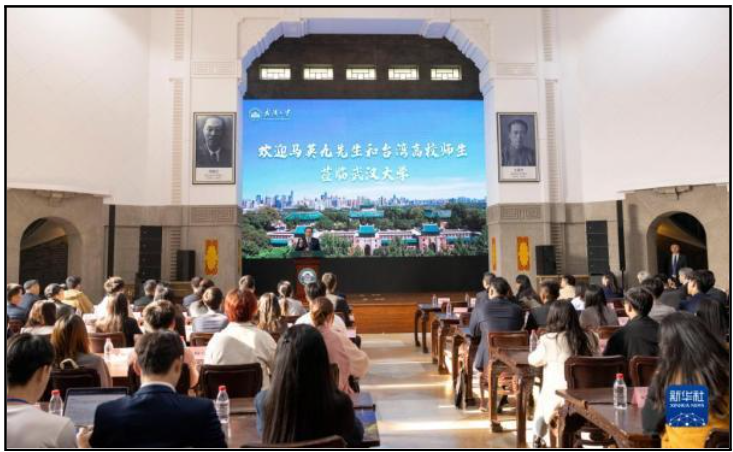
Image: Ma Ying-jeou speaks before a “student exchange” forum held on March 30 at Wuhan University. (Image source: Shanghai Observer)
“Youth Exchanges” as a Core Element of CCP United Front Policy Towards Taiwan
Although Beijing has frozen out any dialogue with Taiwan’s current Democratic Progressive Party (DPP, 民進黨)-led government—which it regularly derides as consisting of “’Taiwan independence’ separatist elements” (“台獨”分裂分子)—it has, at the same time, emphasized what it terms “people-to-people exchanges” (or “among the people exchanges,” 民間交流) with selected groups in Taiwan. Such exchanges are nominally non-governmental in nature; however, from the PRC side they are carefully controlled and stage-managed by organizations within the CCP’s “united front work” (統戰工作) bureaucracy. Within this framework, “youth exchanges” (青年交流) are a major focus of united front work directed at cultivating and coopting groups within Taiwan society. [1]
Many illustrative examples exist of the CCP’s intensified propaganda-cum-cultivation efforts focused on “Taiwan youth” (臺灣青年) in recent years. For example, at the “14th Cross-Strait Forum” (第十四屆海峽論壇) convened in July 2022 in the city of Xiamen, a centerpiece of the event was the reading of an open letter to Taiwanese young adults nominally written by CCP General Secretary Xi Jinping (習近平). In addition to praising the forum’s participants for their “bonds of affection with the mainland,” the letter reiterated key themes of this united front outreach: namely, that young adults from Taiwan should take up opportunities to live and work in the PRC. The letter promised that the government would:
[C]reate positive conditions for Taiwan youth to study in the mainland, to take up work, to be entrepreneurs, [and to find] life with many benefits. [We must] allow more Taiwan youth to understand the mainland, [and] proceed together in one heart with mainland youth, cooperating and striving [together], persevering, moving rapidly, allowing youth to blossom in the great course of realizing the rejuvenation of the Chinese people and the Chinese dream.
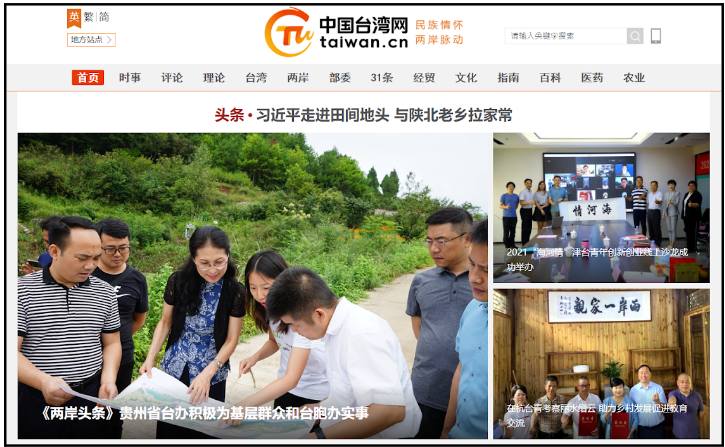
Image: A September 2021 screen capture from the Chinese government propaganda news website China Taiwan Net. Each of the three pictured news stories is focused on “Taiwan youth” (台青) involved in activities in the PRC. Clockwise, from left: “Guizhou Taiwan Office Actively Works at the Grassroots Level for the Masses and [Shows] Taiwan Compatriots the True Story;” “2021 ‘Ocean-Seas Feeling’ Tianjin-Taiwan Youth Innovation Online Salon Successfully Conducted;” and “Taiwan Youth in Hangzhou Investigate [the Beautiful Countryside], Assist Rural Development and Advance Education Exchanges.” (Image source: www.taiwan.cn, September 14, 2021)
In CCP united front-organized outreach events, a common practice is to feature testimonial speeches by selected “Taiwan youth” to discuss the lucrative business opportunities they have found in the PRC. Several of these individuals—many of whom are identifiably linked with CCP-controlled front organizations—are featured regularly in PRC state media as exemplars of financial success. [2] Many examples of this approach could be cited, but one such recent event was a January 10 forum for Taiwan youth held in Beijing, hosted by CCP Central Taiwan Office Director Song Tao. Under a theme of “strengthen exchange cooperation, deepen integrated development, create a shared glorious future” (加強交流合作, 深化融合發展, 共創美好未來), the forum hosted “31 Taiwan youth engaged in the arts, education, the medical field, finance, law, [or] managing enterprises, or studying at Tsinghua University, Beijing University, Central Nationalities University, or other institutions of higher learning.”
In addition to the usual boilerplate comments from Song Tao—such as the need to “resolutely oppose ‘Taiwan independence’ separatism and foreign interference” (堅決反對“台獨”分裂和外來干涉)—the meeting featured scripted testimonials about the economic opportunities available in the PRC: “In the forum, six Taiwan youth representatives spoke about their experiences and realizations in coming to the mainland to work, live, study, and undertake new endeavors; [and how they] looked forward to cross-Strait exchange, integrated development and devoting their efforts to national reunification, [and] realizing their dreams in the course of China’s modernization.”
Conclusions
Although there is nothing intrinsically wrong with youth exchange activities—and travel can certainly be a positive thing, in terms of opening up new experiences and insights for young people—any participant engaging in an “exchange” activity in the PRC should go into the process with their eyes wide open. Such programs are never genuine “people-to-people” exchanges; by contrast, they are processes carefully controlled by the CCP’s united front bureaucracy, and are oriented towards advancing CCP propaganda themes and policy goals. In this context, the student delegation accompanying Ma Ying-jeou will almost certainly be approached by their PRC interlocutors in the terms of the CCP’s larger effort to cultivate “Taiwan youth”—that is, as part of a broader effort to engage in cultivation-cum-cooptation of persons whom the united front system hopes will be useful for advancing CCP goals in the future. Whether they may be traveling in the company of a former president or not, “Taiwan youth” are a key targeted demographic within the CCP’s broader subversion efforts directed at Taiwan.
The main point: A delegation of university students from Taiwan has accompanied former ROC President Ma Ying-jeou on a 10-day trip to the PRC. These students, like other young adults, are a key group targeted in the CCP’s united front efforts directed at Taiwan.
[1] The four specified sub-categories of the party’s work in this area are: “youth exchanges” (青年交流), “grassroots exchanges” (基層交流), “cultural exchanges” (文化交流), and “economic exchanges” (經濟交流). See: “Expanding People-to-People Exchanges, Deepening Integrated Development” [擴大民間交流 深化融合發展], People’s Daily, July 15, 2022, http://tw.people.com.cn/BIG5/n1/2022/0715/c14657-32475917.html.
[2] For two examples of earlier articles that sketch out this phenomenon, see: John Dotson, “The China Cross-Strait Academy: A Case Study in CCP United Front Cultivation of Taiwan Youths and Media Manipulation,” Global Taiwan Brief 6, issue 13 (June 30, 2021), https://globaltaiwan.org/2021/06/the-china-cross-strait-academy-a-case-study-in-ccp-united-front-cultivation-of-taiwan-youths-and-media-manipulation/; and John Dotson, “The CCP’s 14th Straits Forum and United Front Outreach to ‘Taiwan Youth’,” Global Taiwan Brief 7, issue 15 (July 27, 2022), https://globaltaiwan.org/2022/07/the-ccps-14th-straits-forum-and-united-front-outreach-to-taiwan-youth/.

